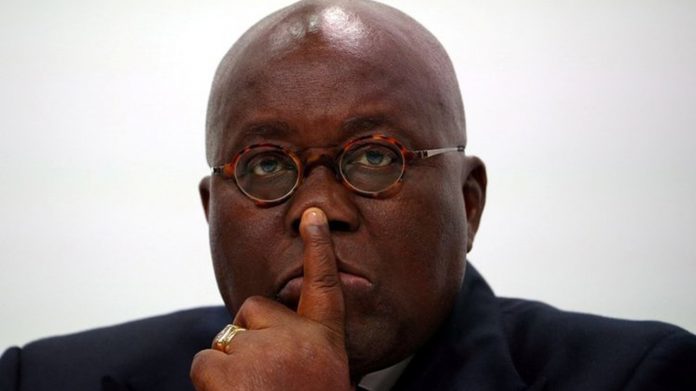By Jeph Ajobaju, Chief Copy Editor
Ghana plans to issue $2 billion in green and social bonds by November, the first country in Africa to sell debt to support development projects, compelled by inadequate revenue from its main export, cocoa.
Ghana is drilling for oil, a side hustle it hopes to translate into a major foreign earner until the world shifts fully away from fossil fuel to green energy.
It plans to borrow additional $5 billion on the international markets in 2021, at a time the African Development Bank (AfDB) warns that African countries run the risk of defaulting on loan payments and earn bad names for themselves.
However, Ghana would become a leader in African social bonding, leveraging an instrument that has grown in popularity since the pandemic, according to Bloomberg.
A green bond is a fixed-income instrument designed to raise funds for climate and environmental projects.
Because these bonds are usually asset-linked and backed by the issuing entity’s balance sheet, they normally have the same credit rating as the rest of the issuer’s debt obligations.
Only a few sovereigns, like Chile and Ecuador, have sold them so far.
Ghana posted its lowest economic growth rate in 37 years in 2020 but said it will use the earnings to continue with free secondary school that began in 2017.
Sustainable bonds “are not cheap, there is no discount,” Ghanaian Finance Minister Ken Ofori-Atta explained. “We will seek to negotiate for the best terms though.”
Africa’s biggest gold miner anticipates output to grow 5 per cent this year, up from 0.4 per cent in 2020; and aims for a budget deficit of 9.5 per cent of GDP this year, down from 11.7 per cent in 2020.
Ghana to borrow $5b
Ghana plans to borrow $5 billion on the international markets and will deploy proceeds from the bonds to refinance loans used for social and environmental projects, and pay for education and health, Ofori-Atta said in Accra.
“The expectation is that the bonds will be issued in the fall and the maximum can be $2 billion,” after Ghana already sold $3.03 billion in March out of the $5 billion for which it has budget approval, Ofori-Atta explained.
Up to $3.5 billion of the total amount will be used to refinance debt already raised. “Our actual new debt will be $1.5 billion,” he added.
Ghana also attempts to enhance tax revenue collection, which has typically lagged behind its regional counterparts.
Nairametrics adds that following adoption on April 1 of a system in which national identity number (NIN) functions as tax number, President Nana Akufo-Addo predicted that the tax base would jump more than fivefold to 15.5 million people.
“We really want to be able to double our tax revenue to about 28 per cent of GDP using digitalisation, so we can create a much more vibrant economy in the next three years,” Ofori-Atta said.
AfDB warns of debt default by African countries
Nigeria, Kenya, Cote d’Ivoire and other African countries had raised more than $17 billion from bond issuances by early 2019, according to the World Bank.
These countries must pay back the debts, even as most loans are obtained to be wasted or stolen outright.
In most African countries, loans are not invested in infrastructure to yield returns to pay off debt. Where loans are invested, contracts are inflated to put the larger part of the sum in private pockets.
In Nigeria, debt amassed by federal and state governments notched N33.11 trillion in the first quarter of 2021 (Q1 2021) and N1.02 trillion was spent to service domestic and foreign debts, a 35.7 per cent rise on N753.7 billion spent in Q1 2020.
Wole Soyinka and others criticise Abuja’s failure to leverage the cancellation of Nigeria’s foreign debt in 2005, secured by then Finance Minister Ngozi Okonjo-Iweala – instead they pile up borrowing mostly for public officers to steal.
Critics say Nigeria is now heavily indebted to China, the World Bank, International Monetary Fund (IMF), and other lenders, which coming generations have to bear.
The African Development Bank (AfDB) has also expressed concern that Nigeria and other African countries run the risk of defaulting on loan payments such that things will get worse.
Rising debt, declining economic output
AfDB disclosed in its Strategy for Economic Governance in Africa document that the risk of debt defaults is increasing among African countries due to decline in economic output compounded by measures to curtail coronavirus.
“Declining economic output as a result of containment measures against COVID-19 and policy measures to stimulate the economies have heightened debt vulnerabilities,” AfDB said, per Nairametrics.
“Public debt now exceeds 50 per cent of GDP in nearly half of its regional member countries. Over the last decade, Africa increased its debt at a faster rate than any other region.
“The risk of defaults on debt, much of which is now non-concessional, has increased. At least 24 African countries have applied for the Paris Club–led Debt Service Suspension Initiative, which would free up resources to fight the pandemic.”
AfDB urged African countries to develop capacity for effective debt management and strengthen growth, financing instruments, and effective governance, which are highly beneficial towards avoiding a debt crisis.
“Building the capacity for debt management becomes important, but there is also a need to revamp the nexus between growth, financing instruments, and effective governance.
“Doing so would ensure that reforms adopted in the context of debt suspension or restructuring are properly timed and tailored towards giving credibility back to governments on their policy actions.
“In other words, the fiscal space that ensues from debt suspension can be put to use towards public investment in strategic sectors and growth-enhancing governance reforms through fiscal consolidation are critical in this context.
“The level of debt in Africa has soared, rising from 38 per cent of GDP in 2011 to 61 per cent in 2019.”
Negative credit outlook
Only six African countries were considered at high risk of or in debt distress in 2013, according to the IMF, quoted by Nairametrics.
In June 2020, the figure reached 20, and it is likely to increase as a result of fiscal pressures heightened by the pandemic.
The IMF said the composition of debt in Africa has changed from less concessional debt to higher non-concessional borrowing, with more options of debt financing, which increased debt stock and may lead to a negative credit outlook.
The contribution of commercial creditors to Africa’s total external debt rose from 17 per cent in 2000 to 40 per cent in 2019.
Eurobond issuance in Africa soared between 2008 and 2018. Although the change indicated growing investor confidence in debt securities issued by RMCs, it also increased the debt burden, according to the IMF.
Nigeria’s debt stock rises to N33tr
Up to N12.47 trillion or 37.67 per cent of Nigeria’s N33.11 trillion debt in Q1 2021 is external and N20.64 trillion or 62.33 per cent domestic.
Latest figures released by the National Bureau of Statistics (NBS), which compiled data from the Debt Management Office (DMO), show federal government’s domestic debt as N16.51 trillion, that of states and the Federal Capital Territory (FCT) as N4.12 trillion.
Lagos State accounts for N507.3 billion or 12.31 per cent of total domestic debt, Jigawa with N31.7 billion or 0.77 per cent has the least.
Nigeria’s overall debt increased by N191 billion to N33.107 trillion in Q1 2021, a 0.58 per cent rise from N32.916 trillion in Q4 2020, according to the DMO.













